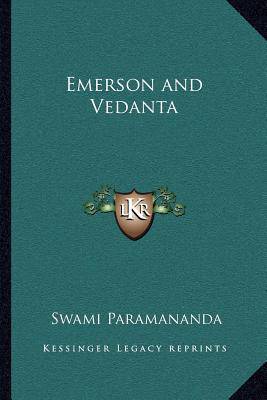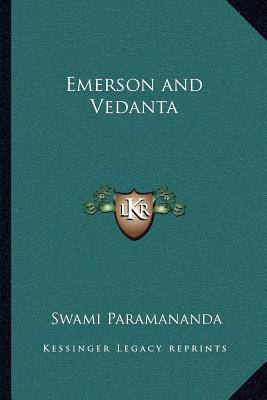
- Retrait gratuit dans votre magasin Club
- 7.000.000 titres dans notre catalogue
- Payer en toute sécurité
- Toujours un magasin près de chez vous
- Retrait gratuit dans votre magasin Club
- 7.000.0000 titres dans notre catalogue
- Payer en toute sécurité
- Toujours un magasin près de chez vous
Description
Emerson and Vedanta is a book written by Paramananda, a Swami who was a disciple of Sri Ramakrishna. The book explores the relationship between the teachings of Ralph Waldo Emerson, a prominent American philosopher, and the principles of Vedanta, a Hindu philosophy. The book begins by discussing the similarities between Emerson's philosophy of self-reliance and the Vedantic concept of Atman, or the true self. It goes on to examine Emerson's ideas about nature and their connection to the Vedantic concept of Brahman, or the ultimate reality. The author also explores the influence of Hinduism on Emerson's thinking, particularly the Bhagavad Gita, and how this influenced his views on spirituality and the importance of individual experience. Throughout the book, Paramananda draws on his own experiences as a Vedantic teacher to provide practical guidance on how to apply these principles in daily life. He also includes excerpts from Emerson's writings and other Vedantic texts to illustrate his points. Overall, Emerson and Vedanta is a thought-provoking exploration of the intersection between two influential philosophies and how they can be used to deepen our understanding of ourselves and the world around us.1918. The purpose of the lectures was to set forth the striking similarity between the writings of Emerson and the sacred teachings of the East. Deep students of Vedic ideals have long regarded Emerson as an inspired interpreter of these ideals to the West. It has always been one of the chief aims of the present author to show the fundamental harmony underlying all phases of higher thought.������� Contents: Emerson and Vedanta; Karma and Compensation; Atman and Over-soul; Emerson and Hindu Classics.This scarce antiquarian book is a facsimile reprint of the old original and may contain some imperfections such as library marks and notations. Because we believe this work is culturally important, we have made it available as part of our commitment for protecting, preserving, and promoting the world's literature in affordable, high quality, modern editions, that are true to their original work.
Spécifications
Parties prenantes
- Auteur(s) :
- Editeur:
Contenu
- Nombre de pages :
- 78
- Langue:
- Anglais
Caractéristiques
- EAN:
- 9781162569772
- Date de parution :
- 10-09-10
- Format:
- Livre broché
- Format numérique:
- Trade paperback (VS)
- Dimensions :
- 152 mm x 229 mm
- Poids :
- 117 g

Les avis
Nous publions uniquement les avis qui respectent les conditions requises. Consultez nos conditions pour les avis.






